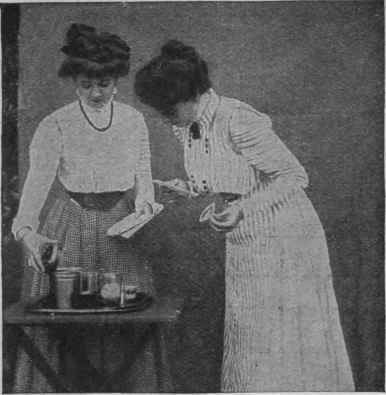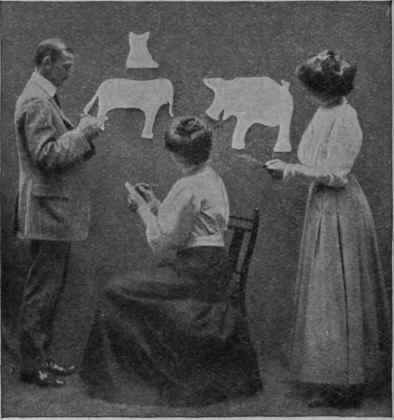Interval For Tea
Description
This section is from "Every Woman's Encyclopaedia". Also available from Amazon: Every Woman's Encyclopaedia.
Interval For Tea
Blowing out the Candle Blindfold Flicking the Cork off a Bottle An Examination Paper in General Intelligence.
Tor the Musical Story Competition each guest must be provided with a sheet of paper bearing a short story, in which the blanks must be filled in with the titles of the airs played on the piano, violin, or banjo, or sung into one of the mock papier mache trumpets, shown in the illustration, in the following order:
1, " Robin Adair "; 2, " Merry Widow ";
3, "Old Folks at Home"; 4, "Within a Mile of Edinburgh Town" J 5, "Vicar of Bray"; 6, "Violets"; 7, "Two Eyes of Grey"; 8, "Robin Adair"; 9, "Meli-sande"; 10, "Merry Widow"; 11, "Come to the Ball"; 12, " Take a step, take two steps"; 13, "Phryne"; 14, "Salome";

The Musical Story Competition. The performer sings a few bars of each air, for the title of which a blank is left on the story paper given each competitor. The winner is the one who fills id these blanks most correctly.

Domestic Problem Competition. Each competitor must judge correctly the contents of the various vessels by appearance alone, no tasting or smelling being permitted
15, "The Chocolate Soldier"; 16, "Post Horn Galop"; 17, "Wore a wreath of roses"; 18, Tosti's "Good-bye."
A few bars only of each air should be played, followed by a pause to give the competitors time to think out and write down each title.
The musical story runs as follows:
" The marriage of (1)-------to the (2)------caused quite a sensation amongst the (3)------. who lived (4)------The ceremony was performed by the (5)
-------. The bride carried a bouquet of (6)-------, which much enhanced the beauty of her (7)
-------. After the wedding, (8)-------said to his bride (9) -------. No longer the (10) -------in a whisper (11)------. Here he persuaded her to
(12)------, and then danced (13)-------and sat out (14)-------and (15)-------, and after taking part in the (16)------bade their kind hostess, who (17) ------ an affectionate (18)-------.
The competitor who fills in correctly the greatest number of blanks wins the prize.
A Domestic Problem Competition
For the Domestic Problem Competition a number of small pots and jars, each bearing a distinguishing number, and containing flour, sago, tapioca, cloves, peppercorns, nutmegs, raw mustard (in powder), fine breadcrumbs, or any similar articles in daily domestic use, are arranged on a table.
The competitors, provided with pencils and with cards bearing similar numbers to those on the pots and jars, come forward, one by one, to examine each jar and write what they imagine are its contents upon the space bearing a duplicate number on the card.
They must judge by appearance alone, for neither smelling nor tasting is allowed.
For the Zoological Competition the hostess writes the names of a number of different birds and beasts and insects on small slips of paper, and folding them up as small as possible, places them in a bowl or jar before the guests arrive.
A number of sheets of white kitchen paper and as many pairs of scissors as there are competitors, must also be put in readiness.
Each competitor, armed only with a sheet of paper and a pair of scissors (no pencil is allowed), draws a slip of paper from the bowl, and having read it, must proceed to cut out his or her respective ideas of a kangaroo, elephant, caterpillar, dog, cat, canary, or earwig.
When the ten minutes' time allowance is up, the hostess collects the paper menagerie, and pins up each zoological specimen upon a dark wall or curtain.
Each drawing is numbered, and the entire party are given voting-papers and invited to award their votes for the best and the worst drawn animals in the collection. These votes are subsequently added up, and the first prize and "booby prize" awarded.
Blowing; Out a Candle Blindfold
An old-fashioned sit-down tea at a cracker-decorated table will be much appreciated at this stage of the proceedings; after which the much-refreshed guests, adorned with cracker jewellery and paper caps, will feel more inclined to enter into the frivolity of Blowing out the Candle Blindfold.
This is a game which can be played in two ways.
In the first way a lighted candle is placed on a small table or pedestal of suitable height at one end of the room, while the guests are collected together at the other. They are then blindfolded one by one, and each player in turn, having been twisted round three times, has to find his or her way across the room to the candle, and then proceed to blow it out.
This is a more difficult proceeding than might be imagined, and the most ludicrous scenes often ensue before any player succeeds in blowing out the candle.

Zoological Competition Each player draws an animal's name from slips in a bowl, and in ten minutes he must produce its likeness with no implements but paper and scissors. Voting decides the merit of the respective drawings
The second plan, which is even more amusing, is to blindfold half the players at once, and let them go forward in a body to blow out the candle.
The player who succeeds in blowing out the candle in the shortest space of time wins the prize. Masculine competitors should have their hands tied behind their backs in addition to being blindfolded.
Flicking the Cork off a Bottle is a novel and most exciting competition. A large wine bottle, with the cork just balanced on top of it - not pushed in - is placed on a pedestal at such a height that the cork is from 4 feet to 4 feet 6 inches from the ground.
The competitors range up in a row, one behind the other, a couple of yards apart, with their right arms straight out before them at right angles from their bodies, and walking as fast as possible round the room, try in turn, with a flick of the finger and thumb to send the cork flying as they pass.
For some impenetrable reason, players almost always flick high, and it is no uncommon sight to see half a dozen people tear four or five times round and round a room or along a corridor before anyone of them succeeds in judging the distance correctly, and flicking off the cork.
An umpire should be provided to stand opposite the bottle during this competition, for any player slackening his or her pace just before reaching the bottle in order to take aim is disqualified, and competitors must quicken their pace to almost a run whilst actually passing by.
The General Intelligence Examination Paper must be prepared by the hostess, who will thus have an opportunity of looking up the answers to any questions she does not know before her guests arrive. Thus she will be prepared subsequently to correct papers and award the prize.
Each set of questions should be written out on parchment paper, and tied with red tape and sealed. Every good examination paper contains a few catches, and the questions might run as follows:
1. How can you at once distinguish a butterfly from a moth?
2. Draw a picture showing the relative sizes of two parcels containing a pound of feathers and a pound of lead.
3. If a goose weighed ten pounds and a half its own weight, what would be the weight of the whole bird?
4. Give the names of the books or plays in which the following characters appeared: (a) The Widow Twankey; (b) The Laird; (c) Becky Sharp; (d) Binkie; (0) Princess Flavia.;..(/) Caliban.

Blowing Out a Candle Blindfold. Each player, blindfold, has to walk to the opposite end of the room, and there blow out a lighted candle placed on a table or pedestal, a very difficult feat
5. How are the numbers written on the face of a clock?
The answers are as follows:
1. A butterfly has clubbed ends to its antennae, while those of a moth are pointed.
3. Twenty pounds, because there must be exactly two halves in a whole.
4. (a) , "Aladdin"; (b) "Trilby"; (c) "Vanity Fair"; (d) "The Light that Failed" (the dog); (e) "Prisoner of Zenda"; (/) "The Tempest."
5. Four is written IIII. instead of IV.
Continue to:


